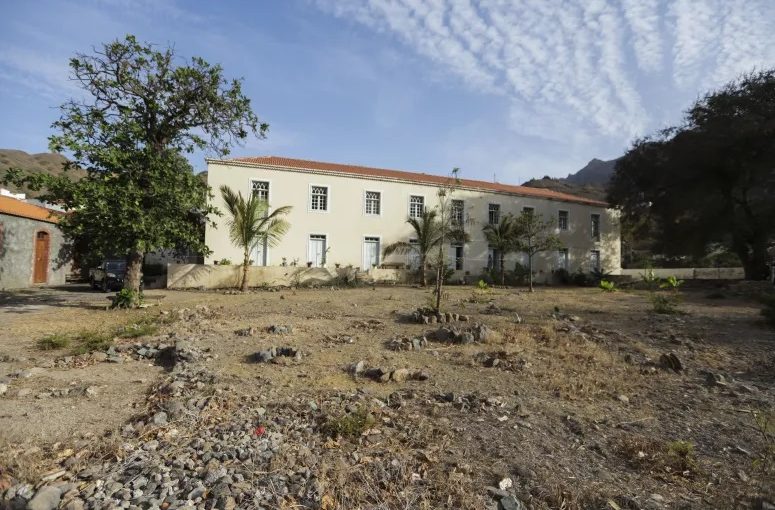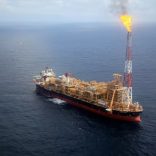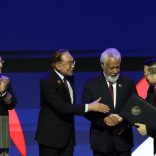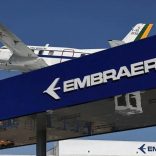Angola gets 60 000 barrels per day oil production bump
Cabo Verde: Brothers reunite 80 years after father deported to Africa

Photo: Lusa
Brothers Joaquim and Deodato Liberal lived unaware of each other for decades, one in Cabo Verde and the other in Portugal until in 2014 they ‘ended’ their father’s 80-year deportation and met.
“It was a promise I made to myself. To help my father find his son,” Joaquim Liberal Spencer, who was raised in Cabo Verde, where practically everyone made a living from fishing and where he worked in the canning industry, following in the footsteps of his father, who died on 30 May 1988, de told Lusa in Tarrafal de São Nicolau.
Joaquim was born in the town of Ribeira Brava, on 7 August 1932, the son of Joaquim Pinheiro Villa, one of the first political deportees from the island of Madeira to São Nicolau, the year before.
“He was always a partisan. He defended the liberal regime,” he explained, justifying the name Liberal given by his father to his brother as well, as he learned years later.
“But he ended up a communist,” he pointed out, without hiding his laughter alternating with pride in his father’s path and intelligence.
Aged just over 19, Joaquim Pinheiro Villa worked in a goldsmith’s shop in Porto – where he was born on 15 November 1907 – during the day and at night he studied engineering.
With the coup d’état on 28 May 1926, led by the military and anti-liberals, which began the period of the Second Republic and then the Estado Novo, Pinheiro Villa’s convictions grew stronger, although, his son assures us, he had no political activity until he was arrested while studying in a café in Porto, as he himself told him throughout his life.
“Not that they caught him at the head of any revolution, he was arrested as a student (…), they entered through the café door and went straight to his table. I mean, they were already keeping an eye on him,” he said, assuring that his father was betrayed by the political police of the time.
“They stuffed a roll of political pamphlets in his pocket. Which he didn’t have. Rascals,” he says.
This was the beginning of a real adventure that would change Villa’s life. He was transferred from Porto to the Civil government in Lisbon and from there, still in 1931, placed in a group of political deportees sent to São Miguel, in the Azores.
“So that they wouldn’t be burdened with expenses, they set him free. But he had to go to the police every 24 hours,” explains his son Joaquim, who, at the age of 90, doesn’t overlook any of the details of his father’s life story.
“He lived in that environment, he was a young boy, and he ended up finding a girlfriend and married the girl in a hurry, an Azorean”, he recalls.
He took an active part in the revolt of deportees and soldiers in April 1931, in Ponta Delgada, which was repressed by the regime, forcing him to flee to the island of Madeira, where he was arrested when he disembarked the ship.
“He had been full of loathing since Lisbon. It couldn’t be otherwise. But he had hoped that one day the dictatorship would fall,” explains his son Joaquim.
Without delay, together with a group of dozens of other detainees, he joined the first group of deportees sent from Madeira to São Nicolau. On that Cape Verdean island, the colonial regime set up the first prison of its kind and concentration camp, respectively in Ribeira Brava, in the then Seminario-Liceu (1866 to 1931), closed to receive the deportees from Madeira, and in Tarrafal (São Nicolau), the predecessor of the Tarrafal camp on the island of Santiago.
Between June and October 1931 he remained in the concentration camp of Tarrafal de São Nicolau, returning afterwards to the seminary building, in Ribeira Brava, 15 kilometres away, up a mountain, a route usually taken on foot by the deportees.
In November 1931, he “got free” through a kind of conditional freedom granted by the authorities, but for several years he was not allowed to leave São Nicolau, as Joaquim explains: “The island was a prison at that time”.
He married a Cape Verdean woman and on 7 August 1932, Joaquim Liberal Spencer was born in Ribeira Brava. Or as he likes to say, “the first child in Cabo Verde”, out of five in São Nicolau, since ten months earlier, as he learned much later, his brother Deodato Liberal Pinheiro Villa had been born in the Azores, the fruit of their father’s first marriage, interrupted by deportation.
“It took me about 80 years to meet him. I was looking for him, my father was looking for him, for the woman he left behind in the Azores,” he said, accusing the regime of having prevented any contact, diverting all correspondence, until Deodato internalised that his father had simply left him behind.
“And he went so many times looking for his son in the Azores, but never found him,” Joaquim, who would eventually find Deodato in 2014 in Oeiras, with the help of relatives, he continued.
“There is no doubt that we are brothers. Because blood connected us immediately,” he says, recalling that after their first meeting, in Portugal, he took Deodato to São Nicolau in April 2014 to get to know the land that was first a prison and then his father’s home, where he was also buried.
“After so many years looking for you, I come to find you here”, Joaquim recalls, about his brother’s words, when he took him to meet, in tears, the grave of their father, in Ribeira Brava.
Today they maintain long-distance contact between Cabo Verde and Portugal, despite health problems, especially for Deodato, who is very weak. Joaquim goes every day to the workshop of the historic Sociedade Ultramarina de Conservas (Sucla) cannery in Tarrafal de São Nicolau, where he began working with his father until he became the owner, a business he has since left in the hands of his son.
“My brother doesn’t hear well anymore, it has to be through his wife,” laments Joaquim, who followed in the footsteps of his father, who between stints in Angola, still became one of the figures in the history of São Nicolau, as a goldsmith, mechanic, locksmith and businessman, even entrepreneur.
This was the case with the wheat seized in São Nicolau from an Italian ship during the second world war, in the middle of a drought period in the archipelago, when Villa took the opportunity to create the first mill in Cabo Verde, and with that, for a few months, guarantee food.
“This saved many people from dying of hunger,” he says.
A story of almost a century in São Nicolau, since his father had been deported there, like many others who ended up staying on the island, which Joaquim says he is turning from memories into a book. He even guarantees that it is his priority, now that he has more time, with fewer chores at the cannery, the island’s largest employer.
“I started two years ago, and now I’m turning it into a book. I read and re-read and I’m already two books in. I’m looking to see when I’ll be able to finish it,” he says, without committing to a deadline.
“It’ll be one of these days,” he said.












Leave a Reply
Be the First to Comment!
You must be logged in to post a comment.
You must be logged in to post a comment.